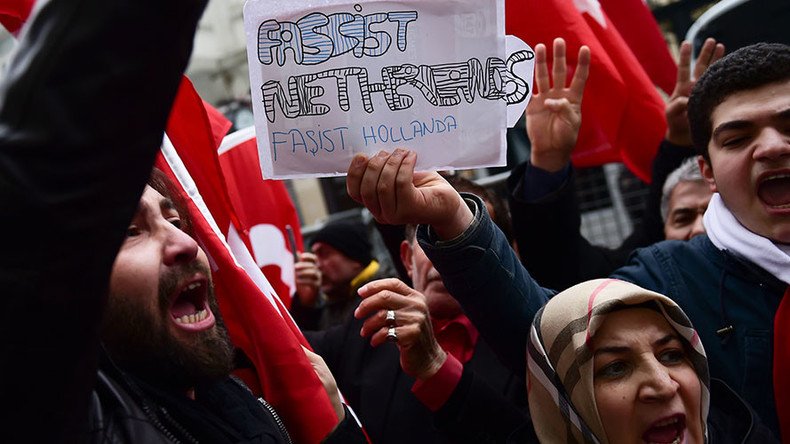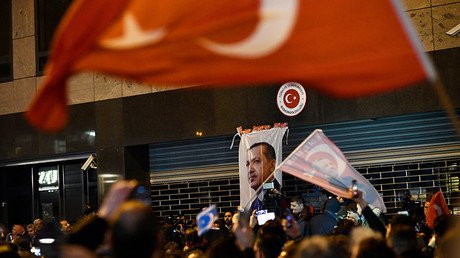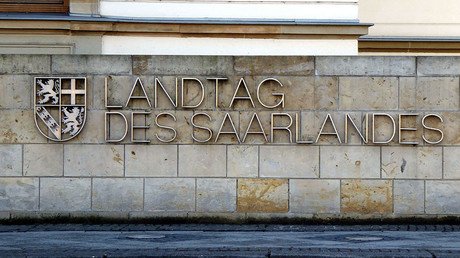‘Dutch are fascists’ remarks distance Turkey from Europe, are ‘detached from reality’ – EU chiefs

Top EU officials have backed the Netherlands in its row with Turkey, with Donald Tusk slamming Ankara’s comparisons of the Dutch with fascists as “completely detached from reality,” and Jean-Claude Juncker warning the comments “distance” Turkey from EU membership.
“The Netherlands is Europe. And today I want to say that Europe is the Netherlands,” EU Council President Tusk said at the European Parliament on Wednesday.
“[The Netherlands] a place of freedom and democracy, [as] for sure [is] Rotterdam, the city of Erasmus, brutally destroyed by the Nazis, which today has a mayor born in Morocco… If anyone sees fascism in Rotterdam, they are completely detached from reality. We all show solidarity with the Netherlands," Tusk added, referring to Erasmus of Rotterdam, a renowned Dutch Renaissance humanist and scholar, who earned the title of ‘Prince of the Humanists.’
Tusk’s statement follows recent remarks by Turkish officials, including President Recep Tayyip Erdogan, who compared the Dutch to Nazis after Turkish politicians were barred from giving speeches in the Netherlands. The Dutch authorities prevented two Ankara ministers from staging rallies for the Turkish diaspora over the weekend aimed at gathering support for mid-April's referendum in Turkey on constitutional amendments that would bolster the president's powers. Dutch police also used dogs and water cannon to break up hundreds of demonstrators waving Turkish flags outside the consulate in Rotterdam.
Prime Minister Mark Rutte later said that his country had the right to deny Turkish politicians opportunities to stage mass rallies on Dutch territory.
Tusk’s words were echoed by European Commission President Jean-Claude Juncker, who told the EU parliament he was “scandalized” by the Turkish comments, stating they drove Turkey further away from becoming a member of the bloc, Ankara’s long-held aim.
“I will never accept this comparison between the Nazis and the (modern-day) governments.
“If you are establishing a comparison with that period, this is totally unacceptable. The one who is doing this is taking distance from Europe and not trying to enter Europe,” Juncker said, as cited by AFP.
On Monday, Ankara banned the Dutch ambassador from entering Turkey, also halting diplomatic flights and suspending high-level government meetings. Erdogan also said Turkey will challenge the Netherlands’ actions in the European Court of Human Rights.
The Netherlands is not the only state to have prevented Turkish officials from holding referendum rallies. Germany, which is home to 1.5 million Turkish voters, cited safety concerns when a number of individual towns revoked public speech permits for Turkish politicians earlier this month. On Tuesday, the German state of Saarland introduced a ban on election campaigns on its soil by foreign officials.
While the decisions have so far been made only by local German authorities and not supported by official Berlin, on Wednesday Chancellor Angela Merkel’s chief of staff, Peter Altmaier, said the country reserves the right to place a general ban on the entry of Turkish politicians as a last resort.
“We are firmly opposed to Nazi comparisons and grotesque allegations. Turkey always attaches great importance to the fact that its honor is not violated. Germany also has honor,” the politician said in an interview with the newspapers of the Funke Mediengruppe.
Altmaier added that Germany “will take a close look at what is responsible and what is not.”
“An entry ban [on Turkish politicians] would be a last resort. But we reserve the right to do that.”
The upcoming Turkish referendum will focus on legislation that would enable the president to issue decrees, declare emergency rule, appoint ministers and state officials, as well as dissolve parliament, which critics say would completely remove the system of checks and balances. President Erdogan says, however, that political change is needed in order to tackle security threats the country faces, including from Islamic State (IS, formerly ISIS/ISIL) and Kurdish militant bombings.
Over the past few weeks, events sponsored by the Turkish government in several European countries, including Austria, Sweden and Switzerland, have also been canceled, while Denmark said it might postpone a planned visit by Turkish Prime Minister Binali Yildirim in view of the spat between Ankara and Denmark’s EU partners.














